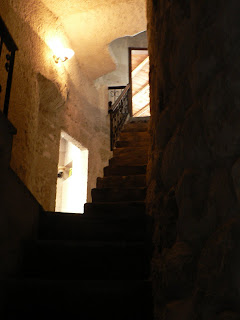Between the sown and the strewn: Goreme and Cappadocia
A Jug of Wine, a Loaf of Bread--and Thou
Beside me singing in the Wilderness--
Oh, Wilderness were Paradise enow!"Despite the fact that Goreme is in Cappdocia and a thousand kilometres from Nishapur, wandering around the countryside here puts me in mind of old Omar the tent-maker (Omar Khyyam), and his Rubaiyat. It's very quite away from the town and one has the feeling that one is on the very edge of the "sown and the strewn". The landscape is remarkable and the valleys are filled with fairy chimney's: the remains of the soft volcanic tuffa of the plateau once the tough, impermeable surface layer has eroded away.
 |
| Cave homes of the troglodytes |
Sue finds the Moslem call to prayer very relaxing, (except when it's conducted at 5am, 7am, 8pm and 11:30 pm - and to confess a truth I'm not sure you should be privy to she's not so sure about the other four pillars of Islam either).
The hotel we're staying in is marvellous - it's built into the soft rock (tuffa) of the area and has numerous small courtyards. Our room is spacious and very decorously furnished: local wooden furniture a rug or two, an archway and a good size bathroom with lots of hot water. A sort of 4.5 star cave of our own that no one else can share.
 |
| The staircase cut into the rock in our hotel |
 |
| Our room in Goreme |
The air (it's evening) is scented with wood-smoke - most houses still being heated by open wood-fires - and the night is very clear and cold with stars unknown to me twinkling high up in it.
Yesterday, walking between the stone spires and chimney's where the farmers still have their orchards of apples and apricots I was put in mind of the verse from the Rubaiyat quoted above
"A book of verse, a jug of wine, and thou
Beside me singing in the Wilderness,
Oh - Wilderness were Paradise enow"
We walked a long way (five or six hours) through what looked like spires of white and rose tinted caster sugar. Their shapes were quite outlandish. It was as if God (Allah) had decided on the 7th day of the world's creation to go to the beach on his day off and build giant sand-castles for his own amusement.
Our guide was a young Turkish man (24 years old) named Iskander (Alexander) and he conducted Sue and me on a tour of the valley's around Goreme.
 |
| Iskander and Susan |
Towards the end of the day, as I discussed our activities for the morrow (mountain bike riding) Sue came down with what I fear is a bad case of pychosomatic knee - she twisted it - which means that she wont be bike riding - but she said that she'll struggle on like a good soldier at the local hamman (steam bath) or down at the local rug and knicknack shop.
Iskander also showed us around the Goreme open air museum which is a collection of fairy castles originally inhabited by the orthodox Christian people of this region. They built chapels and carved churches into the soft rock. Unfortunately most of these people left centuries ago, with the final remaining Christians leaving during the population exchanges conducted after the Turkish war of independence in the early 1920's.
 |
| A chapel (St Barbara's) carved into the rock in Goreme. |
In the early morning the sky around Goreme is filled full of balloons. The pass so close to the tops of the fairy-spires and the minarets of the mosques that you're constantly filled full of fear that the balloons will be torn by the tips of either.
There's another link between Omar Khyyam and Cappadocia too. Khyyam has long been suspected of being a sufi, Certainly the rubai (four line poems) attributed to him have a very sufi cast and Cappadocia has long been susceptible to the wandering dervishes and their sufi teachings.
But enough of fairy castles, dervishes, Rumi and ballooning for now - we're about to go to dinner with a local family. But I leave you with another of old Omar's rubai's:
"And, as the Cock crew, those who stood before The Tavern shouted-"Open then the Door!You know how little while we have to stay,And, once departed, may return no more."






Comments
Post a Comment